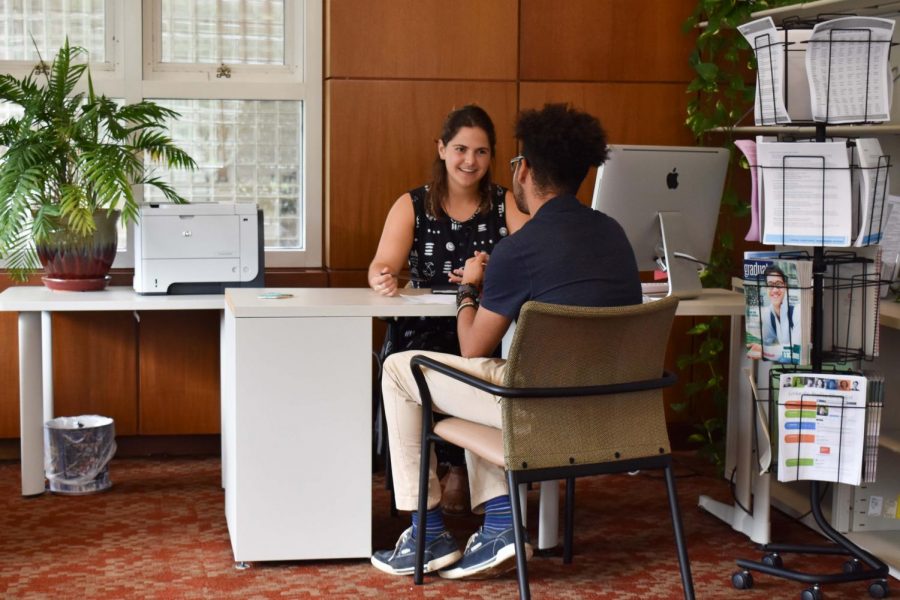Career Center Unveils New Career Strategy
College seniors Sadie Keller and Marcus Hill talk in the Career Development Center. The Career Development Center recently launched a series called Career Communities.
The Career Development Center is preparing to implement a new Career Communities Strategy in an effort to help students secure jobs after graduation. The initiative will create communities based on shared fields of interest and will be led by an expert advisor who has experience working in relevant industries.
“The Career Communities Strategy … is about helping students make those connections between what they’re studying to potential career industries of interest,” said Lori Young, Director of the Career Development Center.
Implementing the strategy represents a major priority for the Career Development Center, but the process remains slow. No hard deadline has been established for the creation of the communities and only three have been fleshed out as concepts: Business Finance and Consulting, Non-Profit Education and Social Service, and the Arts and Creative Careers Community.
College third-year Miyah Byers has been working with the Career Center to develop the communities the program will focus on and agrees that connections are essential in obtaining post-graduation employment.
“It’s community, community, community,” Byers said. “At the end of the day, it is about who can put in a good word for you to somebody [who is] important and bring you in. That’s why having connections and being able to build them, having the skills to network with someone, is so important.”
Some hope that the community groups will create much-needed career resources for students interested in the arts.
“Anyone who is doing anything that is involved with film … it’s about who you know,” Byers said. “Other schools … have connects [sic], have networks, if you know us you know them. I think that’s something that Oberlin is trying to build.”
To mitigate this, the Career Center has proposed an Arts and Creative Careers Community and has worked closely with Conservatory faculty to understand the needs of students hoping to work in the arts.
Prior to the Communities Strategy meetings, the Office of Conservatory Professional Development, run by Director Dana Jessen, was the only arts-specific employment resource on campus. However, the office was mostly geared toward Conservatory students. An informational sheet Jessen shared with the Review mentions the office helping College students only in the context of those in double-degree or Musical Studies programs.
Yet, many of the things Jessen helps Conservatory students with are applicable to College students pursuing careers in the arts.
With the Arts and Creative Careers Community, the Career Development Center is seeking to replicate the type of services Jessen offers with students across departments and outside of the Conservatory.
“One exciting aspect of the new program is its focus on combining resources of both the Conservatory and the College while strengthening interactions with alumni and parents from both areas,” wrote Peter Swendsen, OC ’99, Associate Professor of Computer Music and Digital Arts and Chair of the TIMARA Department, in an email to the Review.
The Communities Strategy, which Young is hoping to start after fall break, reflects an administration priority to increase its employment-oriented resources.
“Review of peer institutions demonstrates that Oberlin is leanly staffed in this area,” Dean of Students Meredith Raimondo said. “At a time when national discourse raises doubt about the value of a college education, Oberlin can play a leadership role by demonstrating how a liberal arts and/or conservatory education are more important now than ever.”
Those working on the project remain excited about its potential impact on the student community.
“There is general excitement just because I think it’s good thing, it’s a good resource, it’s going to help put a lot of Oberlin students on the map if it’s successful and done correctly,” Byers said.







